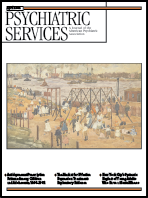Bereavement in the Context of Serious Mental Illness
Abstract
OBJECTIVE: This study examined whether the situational factors that contribute to severe grief in the general population predicted the severity of grief in a sample of persons who had diagnoses of serious mental illness. METHOD: Research participants who had a diagnosis of a serious mental illness and who reported the death of a close friend or family member during a five-year service evaluation project were asked to detail the circumstances that surrounded the death and to rate how the death affected their lives. Key research measures included the self-rated measurement of the impact of the death, the self-rated measurement of the duration of the reported grief, and scores on a psychiatric symptom assessment in the six months after the death. A regression analysis tested the cumulative count of four situational factors—residing with the close friend or family member at the time of the death, the suddenness of the death, having low social support, and having concurrent stressors—as a predictor of severe and prolonged grief. RESULTS: In the sample of 148 individuals with serious mental illness, 33 (22 percent) reported the death of a close friend or family member as a significant life event that resulted in relatively acute and brief grief (15 individuals, or 10 percent) or severe and prolonged grief (18 individuals, or 12 percent). The regression analysis confirmed that the more situational factors that occurred at the time of the death, the more severe the grief reaction was, irrespective of psychiatric symptomatology. CONCLUSIONS: Mental health services for persons with serious mental illness should begin to incorporate preparation for parental death and bereavement counseling as essential services, and such interventions should approach bereavement as a normal rather than a pathological response to interpersonal loss.



